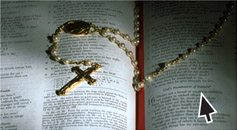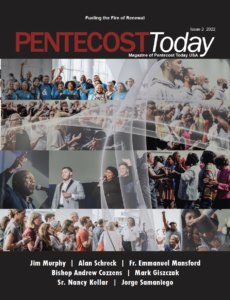Second Sunday of Advent
Meditation and Questions for Reflection or Group Discussion
Mass Readings:
1st Reading Baruch 5:1-9
Responsorial: Psalm 126:1-6
2nd Reading: Philippians 1:4-6, 8-11
Gospel: Luke 3:1-6
Advent, A Time to Fix Our Eyes on Jesus and His Presence in Others
God is leading Israel in joy. (Baruch 5:9)
When was the last time you saw Jesus in another person? Not just in a vague “I suppose so” way, but in a specific inspiring “Hey! I just felt the Lord!” way?
While it may not seem so at first, this is the kind of vision that Baruch gives his people in today’s first reading. Baruch is speaking to the people of Jerusalem—a people who have survived a devastating military assault and who are now living hand to mouth in their city of ruins. Most of their fellow Israelites were carted off to exile in Babylon, leaving behind them a dreary and war-torn landscape.
Seeing his people’s distress, Baruch gave them an unexpected message from God. Rather than telling them to look up and fix their eyes on the Lord, he directed their gaze out, where they would ultimately see their exiled brothers and sisters coming home in joyful procession. He promised that if they looked closely enough, they would see God’s presence in the midst of these returnees. They would see it for the miracle that it was, and that vision would fill them with joy.
What Baruch told the Israelites the Holy Spirit wants to tell you: If you want to see Jesus, don’t just look up to heaven. Look out at the people around you as well.
Try an experiment at Mass today. Every time you stand (for the Gospel Acclamation, the Creed, the Great Amen, and the Communion procession), look at the people standing with you. Tell yourself, “These are my brothers and sisters. Jesus has given them to me so that I could find him more easily. Each one of them reveals a different facet of God’s love and faithfulness.”
All these people surrounding you are precious to the Lord. Together with you, they make up the body of Christ. This means that Jesus is present in them, just as he is present in the Host and the chalice. So don’t just look up. Look out as well, and marvel that Jesus is coming to you in such a personal way.
“Lord, open my eyes to see you!”
(Many thanks to The Word Among Us (www.wau.org) for allowing us to use meditations from their monthly devotional magazine. Used with permission.)
Download a .pdf of this week’s Reflection and Questions here:

Questions for Reflection or Group Discussion:
- In the first reading, Baruch addresses these encouraging words to the city of Jerusalem regarding the exiles from Israel in Babylon, Jerusalem, take off your robe of mourning and misery, put on the splendor of glory from God forever … Up, Jerusalem! stand upon the heights; look to the east and see your children gathered from the east and the west at the word of the Holy One, rejoicing that they are remembered by God. Led away on foot by their enemies they left you: but God will bring them back to you borne aloft in glory as on royal thrones.
- What do you think these words meant to the people remaining in Jerusalem, as well as the exiles in Babylon?
- What about you? In what ways are these words a source of hope to you regarding your children, grandchildren, and other family members who have strayed from their faith?
- Are these words also a source of hope to you regarding other circumstances that are weighing you down (e.g., personal problems, family circumstances, grief over the loss of a loved one, job situation, world situation, etc.)?
- The Responsorial Psalm is a song of joy and hope, probably sung shortly after Israel’s return from exile: When the LORD brought back the captives of Zion, we were like men dreaming. Then our mouth was filled with laughter, and our tongue with rejoicing. Then they said among the nations, “The LORD has done great things for them.” The LORD has done great things for us; we are glad indeed.
- In what way was the people’s “rejoicing” when the LORD brought back the captives of Zion not just some temporary external “joy” but an inner joy because The LORD has done great things for us?
- How would you describe the ways the Lord’s actions have brought a special joy into your life?
- In what way is this also a message for us who celebrate with joy the coming of our Lord at Christmas?
- The Second Reading is St. Paul’s beautiful prayer, which begins with these words: Brothers and sisters: I pray always with joy in my every prayer for all of you, because of your partnership for the gospel from the first day until now. I am confident of this, that the one who began a good work in you will continue to complete it until the day of Christ Jesus. It ends with these words: And this is my prayer: that your love may increase ever more and more in knowledge and every kind of perception, to discern what is of value, so that you may be pure and blameless for the day of Christ, filled with the fruit of righteousness that comes through Jesus Christ for the glory and praise of God.
- Do you believe, as Paul does, that the one who began a good work in you will continue to complete it until the day of Christ Jesus? Why or why not?
- How can you use Paul’s prayer to increase your expectancy that God will answer your prayers during this special season of grace, and how you can use the prayer to pray for certain family members and others?
- In the Gospel, we are introduced to John the Baptist. The reading ends with these words: John went throughout the whole region of the Jordan, proclaiming a baptism of repentance for the forgiveness of sins, as it is written in the book of the words of the prophet Isaiah: A voice of one crying out in the desert: “Prepare the way of the Lord, make straight his paths. Every valley shall be filled and every mountain and hill shall be made low. The winding roads shall be made straight, and the rough ways made smooth, and all flesh shall see the salvation of God.”
- Why do you think John the Baptist was a voice of one crying out in the desert?
- In what ways are John’s proclaiming a baptism of repentance for the forgiveness of sins related to the words of the prophet Isaiah?
- During Advent, how can you be a witness to your family members and others, so that they “shall see the salvation of God”?
- The meditation is also a reflection on the First Reading. It ends with these words: What Baruch told the Israelites the Holy Spirit wants to tell you: If you want to see Jesus, don’t just look up to heaven. Look out at the people around you as well. Try an experiment at Mass today. Every time you stand (for the Gospel Acclamation, the Creed, the Great Amen, and the Communion procession), look at the people standing with you. Tell yourself, ‘These are my brothers and sisters. Jesus has given them to me so that I could find him more easily. Each one of them reveals a different facet of God’s love and faithfulness.’”
- What do you think will happen if you try the experiment described in the meditation?
- Why do you think it is important to see “the people standing with you” at Mass as “your brothers and sisters … and marvel that Jesus is coming to you in such a personal way”?
Take some time now to pray that the Lord would open your eyes to see him more clearly, especially in your brothers and sisters in Christ. Use the prayer below from the end of the meditation as the starting point.
“Lord, open my eyes to see you!”
[The discussion questions were created by Maurice Blumberg, who is currently a member of the board of directors of the ChristLife Catholic Ministry for Evangelization (www.christlife.org), a member of the National Service Committee Council of the Catholic Charismatic Renewal (www.nsc-chariscenter.org), and a board member of The Love of Christ Foundation. Prior to this, Maurice was the founding executive director of the National fellowship of Catholic Men, a chairman of the board of The Word Among Us (www.wau.org), and a director of partner relations for The Word Among Us Partners ministry. He can be contacted at (Enable Javascript to see the email address) mblumberg@wau.org or mblumberg@aol.com.]

 Click Here for us to pray for your intentions through our new website.
Click Here for us to pray for your intentions through our new website. 
